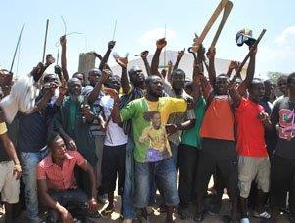From far away in the distant land of Australia, the news of the merciless slaughter of innocent Ghanaians in pursuit of justice in recent times sent shivers down my spine. The much-publicised murder of Major Mahama is a most despicable act deserving of condemnation, and worthy of the public attention it received.
Nowhere in a modern democracy such what is practised in Ghana will people have the dexterity to take human life without fear of recrimination. But such has been the Ghanaian society for some time given the occasional rumours of instant justice.
These killings strike at the very heart of humanity! Never again should any Ghanaian suffer this fate regardless of their guilt or otherwise. In any case, the Judicial system is the sole institution responsible for the administration of justice in Ghana, as in other democracies.
The fight against mob justice can only be won if, and only if every Ghanaian, regardless of sex, age, religion, status, family background, occupation, level of education and class is deemed as important as any other. The outpouring of public sympathy to Major Mahama’s family in the wake of his death is unprecedentedly, as is the state support in granting a state burial.
These honours are most deserving of a gentleman who dedicated his life to the protection of the country and its people. However, the lack of adequate attention, the absence of public sympathy in the aftermath of the lynching of an alleged witch at Pelungu in the Upper East region is worrying. Every single case of mob justice deserves as much public attention; no one knows who will become the next victim.
To win a battle, one must know the enemy; the enemy in this instance, is mob justice. State institutions, the media and civil society organizations must work together to demonize this enemy of instant justice if the country is to win this battle. Since the incident, little is heard about developments or measures intended to curb such acts in the future, and this could eventually enable people to return to the uncivilised killing of innocent Ghanaians quietly in communities, particularly, in remote rural areas.
The onus lies with Parliament and the National Commission on Civic Education (NCCE) to lead the way in the fight against the monster of mob justice. The enactment of a law criminalizing mob justice could be the beginning of the fight. This could help broaden the legal framework, and increase the number of charges that could be brought against anybody participating in instant justice.
In line with this, it will be most suitable to adopt earlier suggestions to consider the enactment of Major Mahama Law to fight instant justice. Not only will the naming of the law be most befitting of the slain soldier, but also serve the purpose given the public attention his murder generated. What remains will be for the NCCE to sensitize people about the law on mob justice.
For the professionalism exhibited by Major Mahama in not fighting the onslaught of civilians against him, he will live long in the memory of Ghanaians. In an era of heightened political polarization in Ghana, the death of Major Mahama united the country on a just course. We must harness this unity for the benefit of all Ghanaians, and in the process, ensure that no one in Ghana will ever again suffer the fate of instant justice.
Opinions of Monday, 25 September 2017
Columnist: Vitalis Mwinyuri Suuron















